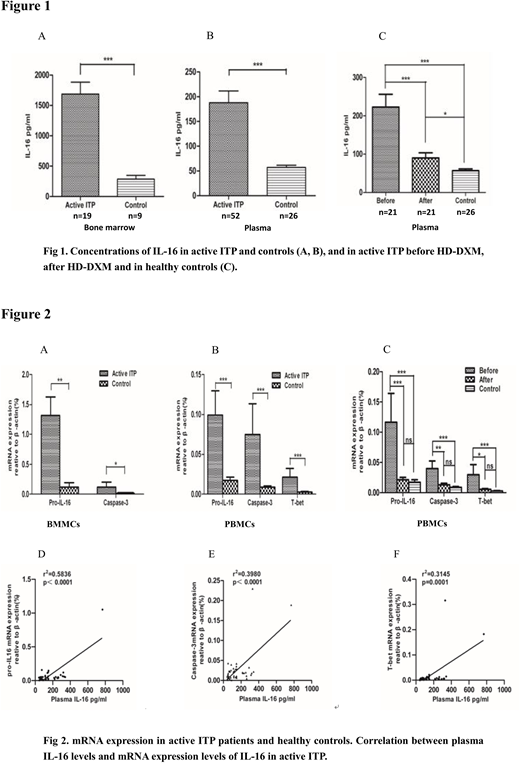Abstract
Introduction: Adult primary immune thrombocytopenia (ITP) is an autoimmune-mediated haemorrhagic disorder characterized by excessive platelet destruction and decreased platelet production. ITP patients have a Th1 dominant profile, which was involved in the pathogenesis of ITP. Interleukin-16 (IL-16) can directly affect cellular or humoral immunity by mediating the cellular cross-talk among T cells, B cells and dendritic cells. Several studies have focused on IL-16 as an immunomodulatory cytokine that takes part in Th1 polarization in autoimmune diseases, but the roles of IL-16 in ITP remain unknown. Treatment with high-dose dexamethasone (HD-DXM) as a single-agent for four days has been widely recognized as the first-line therapy for ITP patients in need of clinical management. The aim of this study is to investigate the roles of IL-16 and effect of HD-DXM on IL-16 in ITP.
Methods: We investigated the differences in IL-16 expression in the bone marrow and peripheral blood between ITP patients and healthy controls by ELISA. The mRNA expression of pro-IL-16, caspase-3 and T-bet in active ITP patients and healthy controls were quantified by real-time PCR. Furthermore, we detected changes in IL-16 concentration and gene expression before and after the 4-day HD-DXM therapy. Bone marrow samples were obtained from 23 patients and 10 healthy bone marrow donors, and peripheral blood samples were obtained from 64 patients (among them, 21 received single-agent HD-DXM therapy, the peripheral blood samples were obtained before HD-DXM therapy and 28 days after HD-DXM administration) and 38 healthy blood donors. Adult primary ITP patients with active disease were enrolled in this study between May 2015 and January 2018 at the Department of Haematology, Qilu Hospital, Shandong University, Jinan, China.
Results: The concentration of IL-16 in the bone marrow supernatants and plasma of active ITP patients was significantly higher compared with that of the healthy controls (P < 0.05) (Fig. 1A, B). Gene expression of pro-IL-16 and caspase-3 in bone marrow mononuclear cells (BMMCs) in ITP patients elevated compared with healthy controls (P < 0.05) (Fig. 2A). Besides, gene expression of pro-IL-16, caspase-3 and T-bet in peripheral blood mononuclear cells (PBMCs) in ITP patients elevated (P < 0.05) (Fig. 2B). Among the 21 patients which received single-agent HD-DXM therapy, 18 responded effectively to the HD-DXM therapy according to the standard definition. The post-treatment plasma (n=21) IL-16 level decreased significantly compared with that of pre-treatment level (P < 0.05), and the level of IL-16 in the plasma of ITP patients before and after HD-DXM treatment was significantly higher than that of healthy controls (P < 0.05) (Fig. 1C). There was no correlation between IL-16 levels in the bone marrow supernatant or plasma and platelet count (data not shown). In addition, pro-IL-16, caspase-3, T-bet mRNA expression was significantly decreased after treatment with HD-DMX (P < 0.05) (Fig. 2C), although the corresponding values in patients were not statistically higher than those of healthy controls. The correlation between the plasma IL-16 concentration and pro-IL-16, caspase-3 and T-bet mRNA levels was also analysed in ITP patients (n = 21). The results demonstrated that the mRNA levels of the three detected factors were positively correlated with plasma IL-16 concentration (r2 = 0.5846, P < 0.05, r2 = 0.3980, P < 0.05 and r2 = 0.3145, P <0.05 for pro-IL-16, caspase-3 and T-bet, respectively) (Fig. 2D-F).
Conclusions: ITP is an autoimmune disorder; complex interactions among antigen-presenting cells, T cells and B cells are pivotal to its pathogenesis. Our data suggest that IL-16 plays an important role in the pathogenesis of ITP by polarization of Th1. Furthermore, by modulating the abnormal IL-16 level associated with the Th1 imbalance via treatment with pulsed HD-DXM provided us with new insights into the immune regulatory mechanisms for the treatment of ITP. In our future study, we will use an in vitro study system to test and verify if the anti-IL-16 antibody can be used to treat adult ITP.
No relevant conflicts of interest to declare.
Author notes
Asterisk with author names denotes non-ASH members.


This feature is available to Subscribers Only
Sign In or Create an Account Close Modal